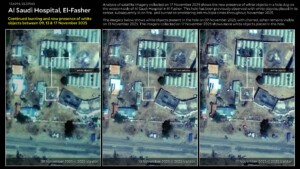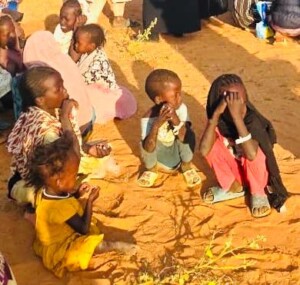Popular Congress Party will not take part in new Sudan govt.
Sudan’s President Omar Al Bashir has reiterated his commitment to implement the recommendations of the National Dialogue. The Popular Congress Party (PCP) however, doubts about the guarantees for the implementation of the Dialogue’s outcomes.
On Sunday, the members of Sudan’s National Dialogue passed the National Document containing the recommendations of the Dialogue committees. Al Bashir stated that the National Document “reflects the will of the people of Sudan”, and “will serve as a basis for the ruling of the country”.
Sudan’s President Omar Al Bashir has reiterated his commitment to implement the recommendations of the National Dialogue. The Popular Congress Party (PCP) however, doubts about the guarantees for the implementation of the Dialogue’s outcomes.
On Sunday, the members of Sudan’s National Dialogue passed the National Document containing the recommendations of the Dialogue committees. Al Bashir stated that the National Document “reflects the will of the people of Sudan”, and “will serve as a basis for the ruling of the country”.
In a speech on the national TV on Thursday, the president said he “is not afraid to allow public freedoms that do not infringe on the Sudanese State and society”.
He conditioned the release of political detainees on the realisation of a peace agreement in South Kordofan, Blue Nile, and Darfur.
He denied that his government “has ever accused, condemned, or criminalised the [African] Fur, Zaghawa, Angasana, or Nuba tribes of insurgency, “despite the rebellion of some of them against the State”.
Guarantees
However, the Popular Congress Party (PCP), one of the seven opposition parties that participated in the National Dialogue, doubts about the guarantees for the implementation of the outcomes of the Dialogue committees.
“There are no guarantees for the implementation of our recommendations, except the President's commitment,” PCP Political Bureau member Abubaker Abdelrazeg told Radio Dabanga in an interview on Thursday.
The opposition leader explained that the Dialogue committees agreed on the restoration of civil liberties and restriction of the competences of the National Intelligence and Security Service (NISS). They also agreed on the creation of the function of a Prime Minister and on direct elections of the Sudanese President, members of the Parliament, the Council of States, and the localities’ commissioners.
The Dialogue member parties proposed the formation of a “transitional government” within three months after the passing of the recommendations. This government will be formed by consensus among the members of the National Dialogue.
Abdelrazeg pointed out that the participants “have patiently dealt with the interventions by the ruling National Congress Party (NCP).
“We agreed for instance on the function of a Prime Minister, to be selected on the basis of consensus. The NCP decided that the PM be chosen by the Sudanese President, and we gave in.”
He confirmed that “the PCP will not take part in the transitional government, which the NCP insists to call the Government of National Reconciliation”.
He further pointed to “the lack of national consensus about the refusal of a number of armed movements and political parties to participate. Khartoum keeps calling on the opposition forces to join the Dialogue, but does not guarantee anything.”
In early 2014, President Omar Al Bashir proposed a national dialogue to discuss all the pressing issues in the country. He called on all the opposition parties and armed movements to join the platform as well. The initiative however faced serious setbacks because of the government’s refusal to create a suitable atmosphere by restoring civil liberties in the country. Several opposition forces subsequently withdrew from the dialogue.
The PCP was established by Islamic leader Hassan El Turabi after he was ousted by Al Bashir in 1999. El Turabi is generally considered to be the mastermind of the 1989 military coup led by Omar Al Bashir, and played a crucial role in designing the new government’s Islamic policies in the 1990s.











 and then
and then